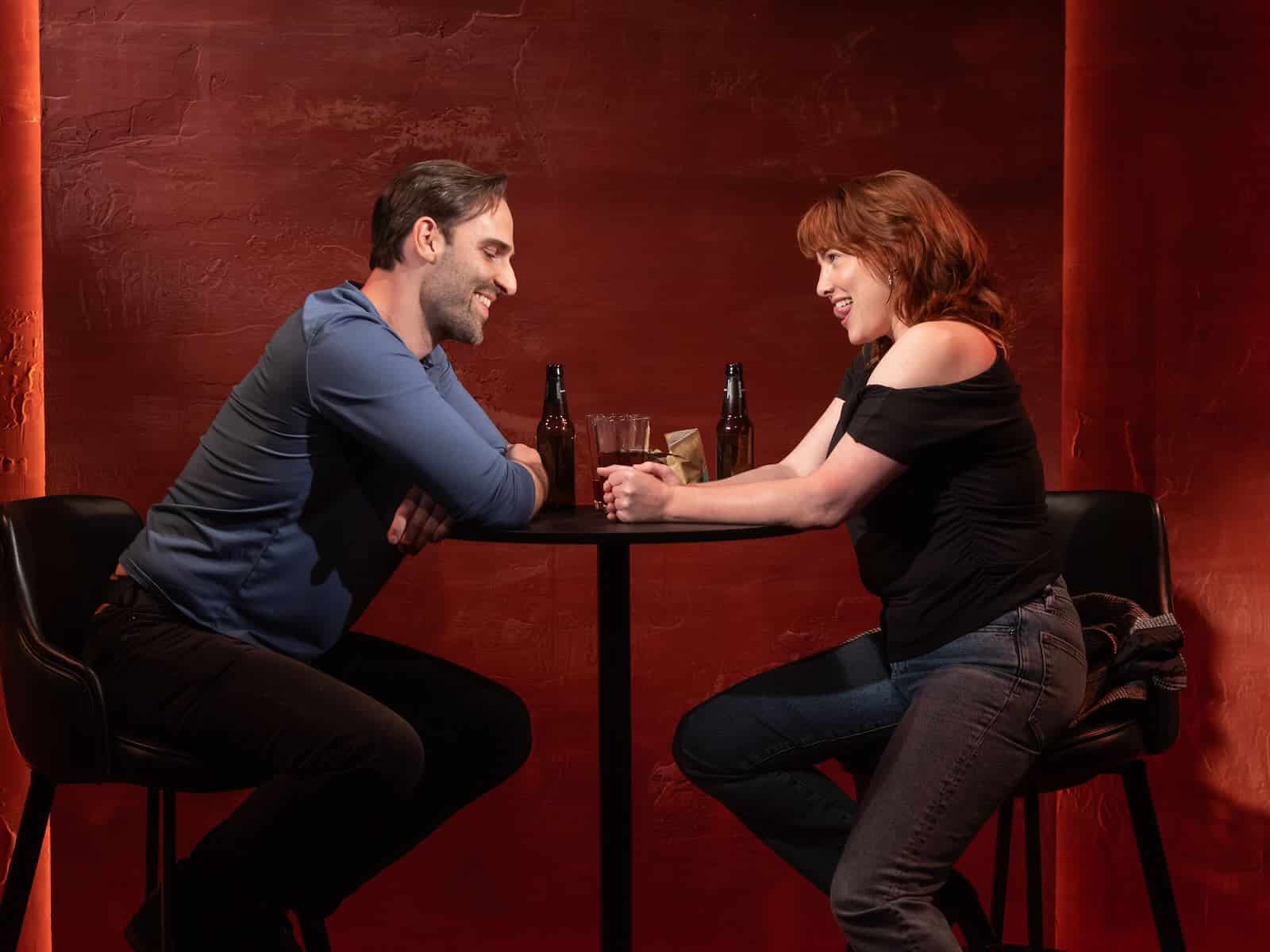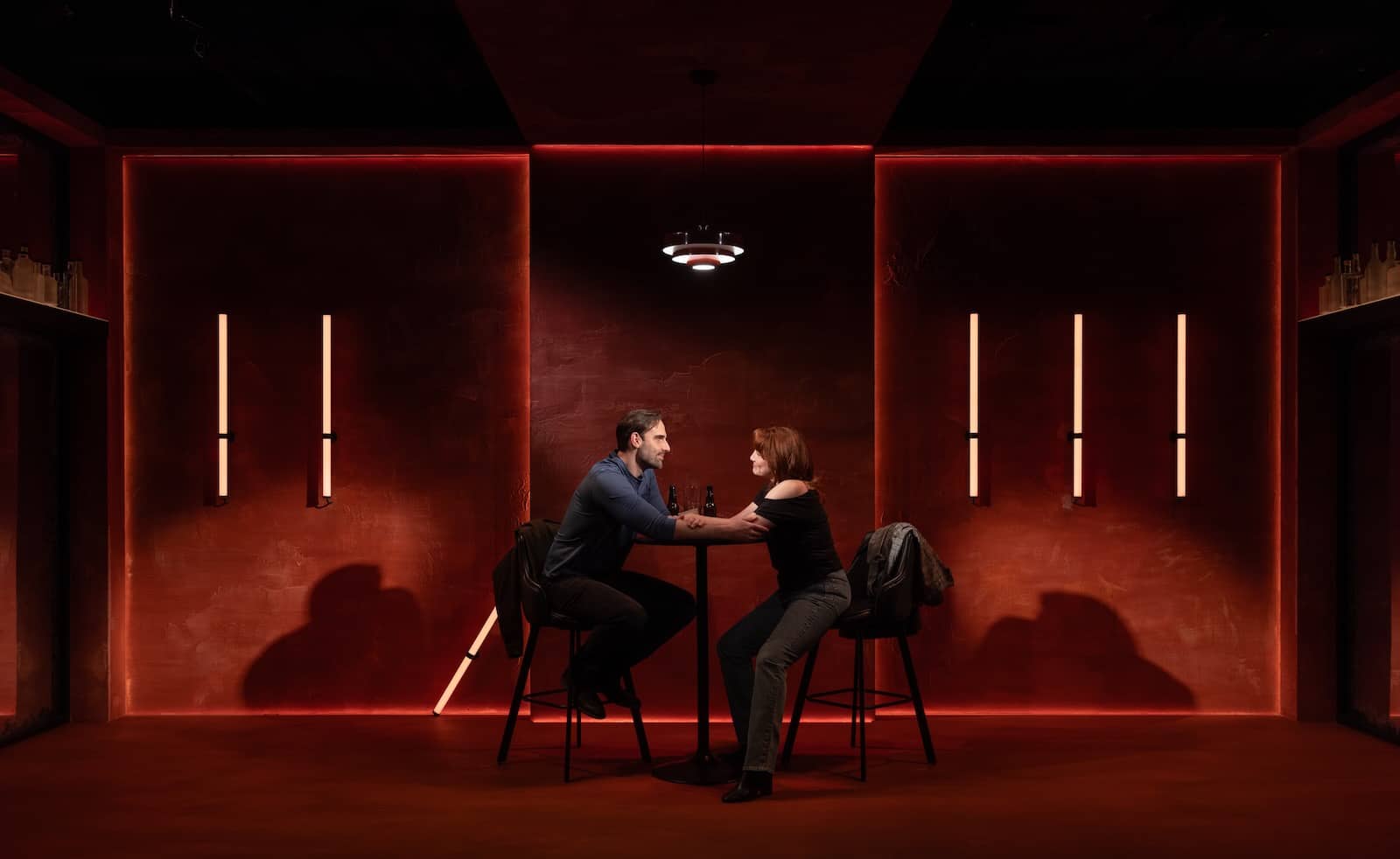If you are still under the illusion that online dating in 2025 is anything other than a hellscape of half-hearted swipes, scripted introductions, and painfully awkward first dates, Miriam Battye — the playwright behind Strategic Love Play, playing through November 9 in an area premiere at Arlington’s Signature Theatre — is here to absolve you of that notion once and for all.
In a trendy New York restaurant, where reddish plaster walls are offset by desilvering mirrors that evoke the screens in our hand as much as reflect the people in front of them, a Man (Danny Gavigan) and a Woman (Bligh Voth) have just sat down for drinks after matching on an unspecified dating app. We’ll eventually learn her name is Jenny (and his, Adam), but she comes in hot from the jump, prodding her uptight suitor with difficult questions and confessing less-than-generous assumptions that make him clam up quickly. Whether he’ll stick it out for the obligatory second drink is anyone’s guess. Because it’s theater, he does, and for 70 minutes the two wrestle with romantic expectations, take stock of the baggage they carry, and dream of what comes next, should this be the match they’ve been waiting for.

In concept and plot, Strategic Love Play rings loudly with echoes of First Date, a musical produced on Broadway in 2013 (incidentally, the same year Tinder introduced the swipe feature on its app) that has enjoyed a number of local productions since: the leading man is haunted by a hang-up on a former lover, the woman is prone to building emotional walls that impede her success in romance and has a friend on-call, and both of them struggle to navigate the quirks of the person in front of them, only connecting when they allow themselves to indulge in baring their souls just a bit. But the shows vary starkly — and consequentially — in how the two end up there. In Strategic Love Play, the matching medium is neither friends nor coworkers, but something inhuman, gamified, and algorithmic (which, presumably, lends the play its name). That alone makes Strategic Love Play not only more recent, but decidedly more modern, and altogether bleaker; it’s an astonishing reminder of how, in such a short amount of time, phone-based dating apps have completely changed the way we meet. “You’re a summary of a person in a phone,” Jenny says at one point. “We will sit in our apartments stacked on top of each other until the day we die.” Oy!
That the characters are listed in the program as Man and Woman is an obvious extension of what seems to be Battye’s thesis: we are ceding our humanity in what is otherwise our most human connection, falsely allowing ourselves to believe that love can be manufactured by a computer. It’s hard to argue with that, but the irony in Strategic Love Play is that Battye fixates so fully on making that argument that she can’t help but sacrifice nuance in characterization in the humans who are her Exhibits A and B. There is obligatory specificity, of course: we hear of their jobs, the names of their friends and past lovers, the good and bad behaviors that shape their dating experiences. But Battye leans so heavily on the adage that opposites attract, which ultimately results in the characters being broad outlines of tropes that must be taken at their word for the whole thing to work. We see them do little, though they talk endlessly about themselves, which is, to be fair, an inherent challenge in a real-time two-hander. But occasional breakout moments of intimacy only underscore the otherwise heavy-handedness. In a lovely sequence that has Man and Woman envision attending a barbecue together, they do things as mundane as handing each other a beer, and the dreaming is ecstasy for them. For a moment, we get a real glimpse of why people put themselves through the online gauntlet, and in seeing the space between that moment of organic personal connection and the algorithmic matching of profiles, Battye makes her point clearer than in any of the more argumentative sequences.
The briskness of the play gives Signature Theatre Artistic Director Matthew Gardiner little room to show off the kind of strong directorial vision he’s imprinted with tremendous success onto musicals like A Funny Thing Happened on the Way to the Forum, Ragtime, and Hair, but the design team had more room for expression. Scenic designer Paige Hathway’s restaurant set, though simple, could double for any bigger-than-it-looks-on-the-outside spaces west of Eighth Avenue in Midtown Manhattan, with a lingering sense that any moment a loud beat will drop and the whole thing will transform into a nightclub. Lighting designer Andrew Cissna’s deep red washes could signal the coming Valentine’s season, or perhaps something a bit more sinister (online dating is a hellscape, remember?), though to singles, they could be one and the same. And Kathleen Geldard’s costumes give the sense that the pair are still trying (but not as hard as they once did) to put their best foot forward. Of all the design elements, Geldard most successfully (though perhaps unintentionally) amplifies the subtext that these exhausted late millennials are feeling the urgency of aging as single people.

Gavigan and Voth work incredibly hard to wring as much from the play as they can and elevate the text. Gavigan rises to the challenge of portraying an initially reserved character, biding his time until he is finally able to open up. He plays distraction well, and finds an easy, but earnest pathos when Adam shares the pain of both lost and unrequited love. Voth channels Jenny’s freneticism consistently throughout the play, and transforms the character’s more self-pitying moments to something darker and, thankfully, more satisfying. Though it falls to Gardiner to balance the production, Voth seems a good partner; the character is a steamroller to her core, and Voth smartly senses when to pull back. In doing so, she allows a surprising decision near the end of the piece to feel earned.
There’s another thread in Strategic Love Play adjacent to the notion that the apps are robbing us of organic connection: that we are too quick to judge whether someone is or is not “the one,” and, further, that we can’t ever explain what draws or repels us from something. In Battye’s world, we just have to give it a try and see for ourselves. Strategic Love Play is one of a number of new works and premieres at Signature this season. If this isn’t “the one,” keep swiping and showing up. There may be a perfect match yet.
Running Time: Approximately 70 minutes without an intermission.
Strategic Love Play plays through November 9, 2025, in the ARK at Signature Theatre, 4200 Campbell Avenue, Arlington, VA. Tickets ($47–$97) are available by calling the box office at (703) 820-9771, online, or through TodayTix. Information about ticket discounts is available here.
The program for Strategic Love Play is online here.
Closed captions are available via the GalaPro app.
Content Warnings: This show contains adult language and themes.
Age Recommendation: Recommended for ages 13+. Signature does not admit anyone under 6.
Special performances include Discussion Nights on October 7 at 7:30 p.m. and October 29 at 7:30 p.m., Pride Nights on October 17 at 8 p.m. and October 24 at 8 p.m.
COVID Safety: Masks are optional in the lobby and other public areas of the building except that face masks are required inside the performance spaces on October 26 at 2 p.m. Signature’s COVID Safety Measures can be found here.
Strategic Love Play
By Miriam Battye
Directed by Matthew Gardiner
SEE ALSO:
Signature Theatre announces cast and creative team for ‘Strategic Love Play’ (news story, September 11, 2025)



